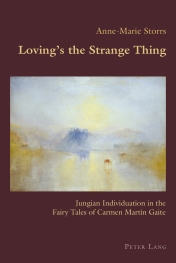 This year we’re celebrating the tenth anniversary of our book series Hispanic Studies: Culture and Ideas!
This year we’re celebrating the tenth anniversary of our book series Hispanic Studies: Culture and Ideas!
The first volume, Postmodern Spain by Antonio Sanchez, was published in 2007. Ten years later the series is going from strength to strength, with Volume 77 hot off the press this month – Anne-Marie Storrs’s book Loving’s the Strange Thing: Jungian Individuation in the Fairy Tales of Carmen Martín Gaite.
We asked the series editor, Professor Claudio Canaparo, to tell us about the origins of the project and reflect on the developments of the last few years:
“At the time we founded the series, it was already clear that changes in academic publishing were starting to affect not only the production and distribution of academic books but also their content and subject matter. This was particularly true for non-mainstream subjects connected with peripheral areas of the planet such as South America. At the time only Tamesis and, in a minor way, Cambridge University Press were keeping alive book series connected with Latin American subjects or were publishing in Spanish in the UK. Serpent’s Tail in London occasionally published some translated fiction and the Institute for Latin American Studies, also in London, produced special volumes once or twice a year.
At the same time a boom was happening in US Latin American academic publishing that was a logical development from the growth of Latin American Studies within US universities over the previous thirty years. For a number of reasons, not many European academic authors were managing to access this growing but still niche market.
As for the Latin American sector, where, following the French publishing model, non-academic publishers sometimes publish academic works, the financial and distribution issues always presented a difficult obstacle to overcome.
Getting an academic book published was already difficult, but under these conditions was becoming more and more difficult, in particular for our younger colleagues across the UK and Europe. Discussions about the publishing landscape were mainly driven by changes in technology and ignored the radical change in subject-orientated matters that were also happening at the time.
After six months of discussions over this state of the art, we agreed with Peter Lang Oxford that we would create a series dedicated to Latin American Studies that would try to tackle all these aspects at once, a series based mostly on the social sciences and the arts. Although it would focus on Latin American issues, the new series would not follow the classical pattern of area studies. The idea was to cover all possible aspects of research without precluding any domain or perspective. ‘Hispanic Studies: Culture and Ideas’ aimed to overcome epistemological and linguistic colonialism. We were also willing to publish not just established authors but also young researchers who were finding it more and more difficult to get their research published.
Ten years later, with almost 80 titles published and a forecast of 7-10 titles per year for the next decade, we can confirm that our diagnosis was correct. ‘Hispanic Studies: Culture and Ideas’ continues to regularly publish original research on the social sciences, arts and literature focusing on Latin America. The series has already touched on areas such as philosophy, sociology, comparative literature, theatre, anthropology, poetry and cinema. We will soon expand it further with research on music and architecture.”
Thank you to Professor Canaparo for sharing his thoughts about the series!
If you are interested in submitting a book proposal to Hispanic Studies: Culture and Ideas, please contact us at oxford@peterlang.com.

